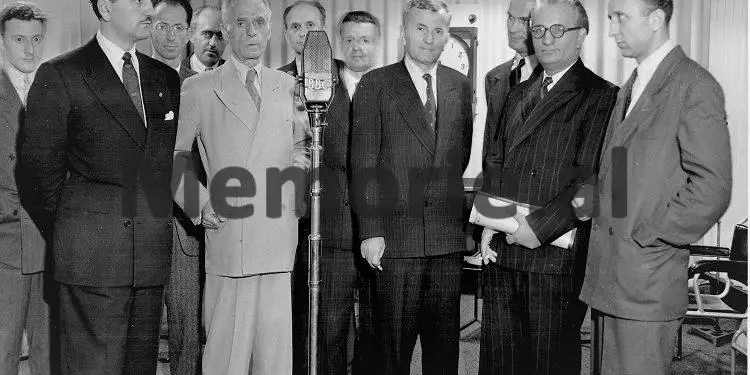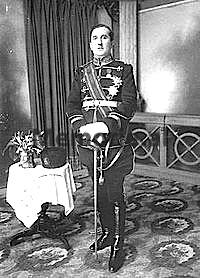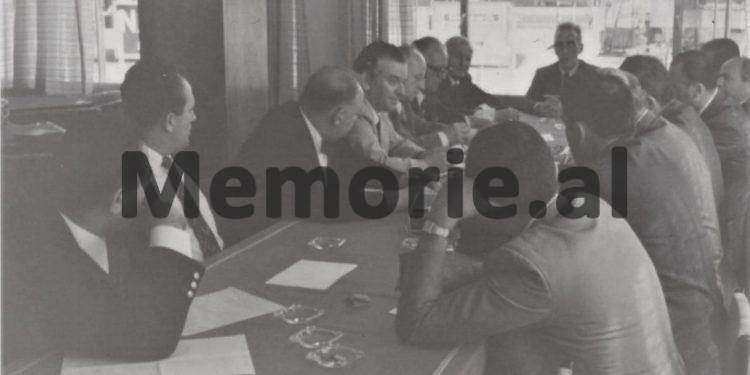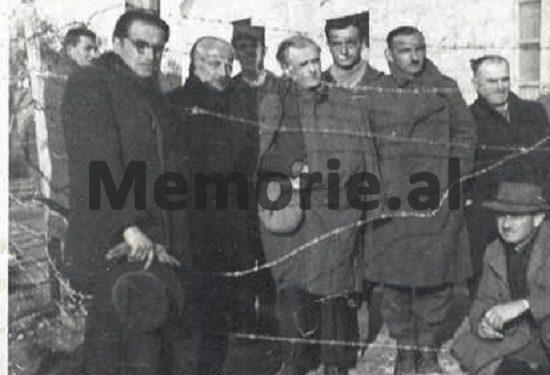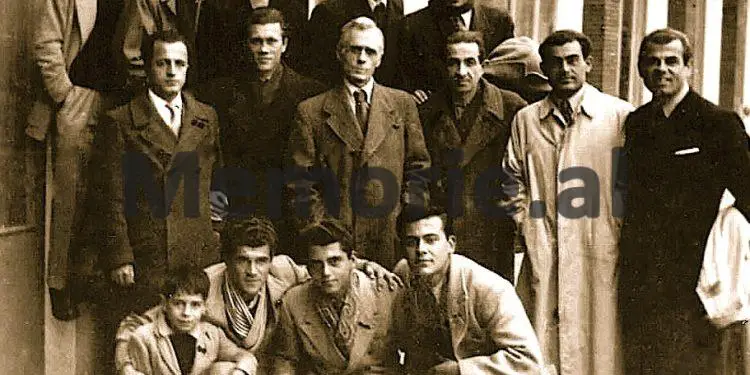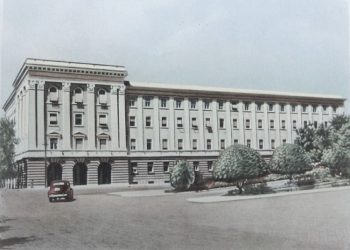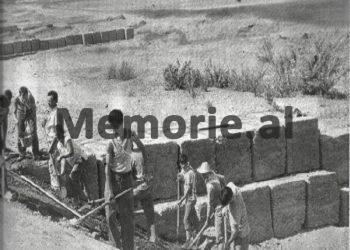By EUGEN SHEHU
Memorie.al / In the history of the Albanian nation of the past century, those Orthodox Albanian men who joined their chests, turning into invincible fortresses of massive heroism, were not rare. Furthermore, their supreme heroism was seen in the determined and just struggle for the protection of our lands from Greek Orthodox chauvinism. Despite all the efforts and Greek foxes, these Orthodox Albanians, not only did not fall into the lap of promises and deceptions, but in the meantime appeared to be leaders in their Albanianism, winning over Hellenisms of every kind. And if we talk about such families and men, the house of the Kottajs undoubtedly remains the outpost of the anti-Greek resistance in Korça and its surroundings.
Born on December 21, 1919, in the city of Korça, Nuçi Kotta would grow up through the culture and major Albanianism of his parents. Nuçi’s father, Koço Kotta, although he did not study in Athens, when he returned to Albania, he turned his house into a nursery of patriotism. Among the initiators of the proclamation of the Republic of Korça, in the company of Mihal Gramenos, Sali Butka and some other patriots, Koço Kotta would greatly influence the demands that the Korça people managed to face with some Greek districts of the city, showing them the place theirs. It is then known what was the place of Koço Kotta, both in the formation of the Albanian state in the first years of the Monarchy, and when he led the Albanian Parliament.
This wise statesman would take care that his sons were educated as best as possible, starting from the good idea that Albania needs sons of the rifle and the pen. After completing primary education, Nuçi Kotta began studying at the French Lyceum of his hometown, which in those years was at quite high academic levels. Here, Nuçi got his first knowledge of the broad French culture, its history and literature.
Meanwhile, in the years 1932-1936, when the energetic interventions of the Albanian government, Korça High School educated its students with national feelings, in this way, in the character of high school student Nuçi Kotta, the patriotic education of the school and parents was conceived, significantly influencing until in the last moments of his life. After finishing high school in Korça, Nuçi Kotta decided to study law.
His lyceum friends remember well that this desire of his came because he could not bear the injustices of the time. Whenever in the various school activities, he stood out for his correctness as well as his help to the poor. They can’t forget Nuci’s great passion for singing Korça national songs, especially that beautiful marsh; “how much you shave Mamedheu”, with text by Kol Tromara, would be sung by Nuçi Kotta, in every artistic activity of the lycheists.
In the fall of 1936, Nuçi Kotta made his way to Paris. He went there with the Albanian state scholarship, thanks to the high results achieved in Korça, as well as his excellent behavior towards his teachers. There he enrolled in the “Louis le Grend” University, known at that time for the high levels of teaching in the field of jurisprudence. Thanks to the habits acquired at the lyceum, he is once again among the distinguished students, and often in the conversations of the French professors, he is called by the nickname “The Smart Corsair”.
But in the meantime, he would not remain indifferent to the events so dangerous for Albania, at the end of the 30s of the last century. A complete correspondence with his father, the statesman Koço Kotta, sheds light on Nucci’s independent spirit. In this exchange of letters, very little place is occupied by family troubles or conversations, but in most of them, it is the fate of the nation that interests Nuçi Kotta, who, in any case, finds a way to address his own father.
Especially this spiritual dialogue takes on significant proportions in March-April 1939, when Albania was fiercely threatened by fascism. The catastrophe was approaching the shores of the Adriatic and while Nuçi’s father took the path of exile together with King Zog, he himself continued his studies, with the great idea of restoring the Monarchy in the Albanian lands. In 1941, Nuçi Kotta, after finishing his doctorate in jurisprudence with excellent results, returns to Albania.
Despite the fact that the French professors of jurisprudence at “Louis le Grand” have expressed their high regard for the “smart corsair”, even offering him jobs at this university, but Nuçi Kotta has not accepted, even though he knew very good that Albania, swaying in its fate like a wooden boat, in the ocean full of storms, the 22-year-old boy from Korça, had a lot of dreams to live in his homeland. For some time he worked as a lawyer in Korça.
Then in 1942-1943, he goes to Tirana and opens a law office there, he does not like to cooperate with the Albanian state of that time, on the contrary, in conversations between friends, he argues how the rights of his compatriots were violated by the judicial bodies Albanian. He often raises his voice in this direction, even near the relevant instances. Meanwhile, he has started to think about the reorganization of the Legality Movement. In the contacts with Abaz Kupi, Isuf Begeja, Ramazan Shpati and Nexhat Mitrovica, Nuçi will establish the idea that in the recent political developments in the country, a return of the Monarchy would have two pleasant consequences for his compatriots.
Firstly, the return of the King of the Albanians would be made possible in Albania, and secondly, the anti-communist coalition in Albania would be greatly strengthened. In October 1943, Nuçi Kotta completely separated from his law office, to devote himself to the revival of the Royal Movement. “Here today and never”, he tells his friends in conversations even without taking into account the communist danger; he organizes the first formations that demanded the return of their legitimate King.
Unfortunately, precisely in October 1943, pushed by Belgrade, the Albanian communists gathered as; “national-liberators”, had intensified the fratricidal war, both against the Ballistas and against the royalists. The clique of Tirana, knowing the reputation and high culture that Nuçi Kotta possessed, did not fail to call him a “traitor”, even the communist circle of Tirana, at all times, kept in its pocket the order for the assassination of Koço Kotta’s son. Red terrorism was raised in the system by Serbian-Albanian orthodox communists.
With unanimous votes, on November 21, 1943, Nuçi Kotta was elected a delegate to the Congress of Legality that was held in Zall-Herr in Tirana, in that religious assembly that demanded the return of monarchist glory and the King of the Albanians. From his hand and mind, there are many of the materials of this historic congress, but I consider it reasonable to bring only this passage from the “Decision of the Congress”, written separately by Nuçi. In addition to others in this treaty of the Legalist Movement, it would be emphasized:
“So today, more than ever, we have an imperative need for a dynamic union, to further consolidate national freedom, for which we are thirsty: freedom will not only be a material goal, but it will be spiritual thread that nature itself marks us. Therefore, this spiritual thread begs to be founded on a spiritual connection, which will have as its main purpose the content, reinforcement and improvement of the human condition, to recognize and respect the rights of each Albanian citizen, as and political equality, without social caste changes. The ship united in its own body, can be sure that it has hundreds of defenses against any attack of the enemy”. (“Atdheu” newspaper, November 28, 1943).
The speech of Nuçi Kotta, at the Congress of Legality, on November 21, 1943, would be conveyed with special respect by the main exponents gathered there. In this speech, he would tear up the loyal royalists; move them as bravely as possible towards the battles against the occupier and against communism, wanting Albania, his captive homeland, to be ranked among the advanced countries of Europe, which have been living for centuries according to monarchist models. “Uninterrupted fight against the enemy and the communists, to bring the King of the Albanians to Albania”, these were the words and message of Nuçi Kotta last night.
Immediately after the historic assembly of the revival of the Monarchy, Nuçi devotes himself to the work of organizing the royal movement in almost all the provinces of the mother country. Announced as a dangerous person by the Albanian communists, he goes completely underground and remains one of the most prominent figures not only in the propagation of monarchist ideas, but also in their construction, through difficult paths. In all the tracts from the hand of Nuçi Kotta, you won’t find any blasphemy or swearing.
Even when the communists sentenced him to death in absentia and when the fratricidal war initiated by the Slavs was taking the lives of innocent people, the appeals of the royal Korçar were only for peace, brotherhood and prosperity of the nation. Participating in several meetings of Abaz Kupi with the English military missionaries, Kotta insisted on aid and weapons, openly announcing to the allies that their war would be long, both against the occupier and against the communists.
In August 1944, he was surrounded by communists, in one of the bases of the Legality Movement, near Tirana. The brave man of the pen, with the brave act of breaking the siege (supported by 4-5 brave men of Abaz Kup), shows that for a warrior, the rifle and the pen are eternal co-travellers, from this moment, Nuçi Kotta was joins dozens and dozens of other Albanian nationalists, who would make the last efforts, for the anti-communist resistance in the northern parts of Albania.
The events of the fall of 1994 were such that with the fall of the THIRD REICH, the Albanian national-liberation forces gained time and opportunity to fight their political opponents. In this fratricidal war, the communist clique of Tirana never stopped spreading red terror in every Albanian heartland. Forced by this terror, along with dozens of Albanians, who are forced to leave their homeland, Nuçi Kotta also had a similar fate. He leaves for Italy and from there moves to France, where it is known that it was so easy to climb the career ladder.
In 1945, he learns how the Greek communists arrest his father and send him to Albania. Here, the staged communist courts sentence him first to death and then to life imprisonment. This would make Nucci faint, but it would not divert him at all from the path he had started. In some of the main newspapers of Paris, Nuçi Kotta’s highly sensitizing writings about the Albanian Golgotha can now be seen. In those writings, he will appeal to the governments of Western countries to turn their eyes to the homeland of the Albanians, because communism there was not at all a desire of the Albanians, on the contrary, it was their hell.
In 1946, after several exams, Nuçi Kotta was accepted as a professor of the Albanian language at the “Ecole Nazionale des langues arientales vivantes”, in Paris. Devoted to studies and archives, he works to bring to light the truths of the Albanian-Greek borders, from 1912 to 1945. After an intensive and tiring work, this year he publishes in Paris, in French, the book “Albania and the issue of the Albanian-Greek border”.
On every page of this book, after the study and research by the scientist, you can feel the powerful argument, which Kotta presented in the French language, to the diplomats of Western Europe. He does not forget to make controversy with some Greek politicians and publicists. Somewhere he writes: “Mr. Fokas Cosmetalos, Greek writer and publicist, in his book published in Paris in 1945, “Greece before the Peace Conference”, says, among other things, that the Albanian state was a product of the rivalries of its neighbors and that the Albanians, before to be like that, they are Italophiles or Slavophiles…! Greek opinion persistently and unanimously demands the return of Northern Epirus and Korça…”! (N. Kotta, “Albania and the issue of the Albanian-Greek border”, Paris 1946, page 181).
Meanwhile, the great Albanian publicist and patriot, through the pages of this book, does not fail to announce; “We think that the best way for the Greeks, especially some Greek intellectuals (for whom the documents of the League of Nations commission have not been enough to convince), go to Albania and see with your own eyes, how many Greeks there are in Gjirokastër , how many Orthodox Albanians harbor Greek feelings, or how oppressed the Greek minority is, located in some villages of the Albanian south” (Nuçi Kotta “Albania and the issue of the Albanian-Greek border” – Paris 1946, page 203).
The publication of the book I mentioned above would be forwarded with interest in the high circles of Western diplomacy, in which case Nuçi Kotta would receive the congratulations of the occasion. But this would not be enough for the martyred son of Korça, he would be present at several meetings of Albanian nationalists, in Rome, Paris and Brussels, in an effort to gather around the idea of Ethnic Albania and the fight for the overthrow of communism in Albania.
During these years, Nuçi Kotta also held several meetings with King Zog, foreseeing in him the Albanian eager for the national issue. I find it appropriate to bring in these lines, an information that the communist clique of Tirana has kept in its archives, for decades, related to the activity of Albanian nationalists in emigration.
The truth is that this information is in the thousands, which shows the great fear that the Albanian communists had of the nationalists. Thus in an information of July 1949, among others it is said textually; “Albanian war criminals have been active especially in the last six months. From the information we have, in June of this year, at the initiative of the English, in agreement with the Yugoslavs, work began on the creation of an executive political committee, with the attributes of a provisional government…!
This Committee, supported by non-direct foreign aid, would undertake the reversal of the situation in Albania, but to be able to do this and all the more so that Yugoslavia-Kosova could become the center from which the activity against Albania would begin. This movement had to be presented as a new movement and the new Committee washed of all the vices of the past. In this maneuver, the Americans thought that, both inside and outside Albania, they would make indifferent people, honest patriots, anti-fascist and neutralize, as much as possible, the army and the state apparatus. Therefore, the New Committee did not simply emerge as combination of political groups, but as a Committee representing the mass of Albanians abroad:
1-Mid’hat Frashëri
2-Abaz Kupi (according to information, he went of his own accord)
3-Seit Kryeziu
4-Nuçi Kotta
5-Zeph Pali
… New York has been designated as a temporary center, but this is said to be temporary, so its real center is believed to be in Trieste with a committee in Skopje, which until now is held illegally”. (Archive of the Ministry of Foreign Affairs-Tirana, War Criminals Fund, File 289, pages 56–57).
Also, in information of the Ministry of Foreign Affairs about the communist clique of Tirana, it is about some of the meetings of the Albanian patriots, who in the Bolshevik language of those times were called “war criminals”. Besides others, this information is written textually; “The reactionary committee has been very active and has taken different forms. Since its birth, it has had a reactionary character. In order not to be completely unmasked, its members have changed their name many times, disguising themselves with different names.
In the beginning, that is, since 1944 (October) they called themselves the “Colony Committee”, then the “National Union Committee” and now the “Albanian Patriotic Movement”. The members of this committee are; Chairman-Nuçi Kotta, members – Ramazan Spata, Haki Elmazi, Zef Salihi, Isuf Begeja, Sefedin Çollaku, Vasil Gërmenji, Nexhat Mitrovica, etc., promoters of the colony are Nuçi Kotta and Ramazan Spata. Directorate of State Security, dated 22.5.1948 on “The current situation of Albanian colonies in different countries”. (Archive of the Ministry of Foreign Affairs, Tirana, year 1948, File 217).
Nuçi Kotta has given a precious help, even for the re-establishment of the national organization of Legality in exile. In 1961, in the organization of this organization, Nuçi Kotte was elected secretary general, from this moment until last night; this royalist developed a wide patriotic activity, making known not only the legalist alternative, but exposing in conferences, meetings, and numerous public articles the totalitarian regime of the communist clique of Tirana.
In 1964, he received his doctorate in French at Columbia University to continue his duties at Stony Brook University in New York. All his scientific activity is inseparable from longing and holy love for his homeland, Ethnic Albania. He closed his eyes in New York on July 20, 1965, leaving his two sons, one three years old and the other a few months old, to his wife to learn to speak the beautiful Albanian language, to love the homeland and the nation. Memorie.al




